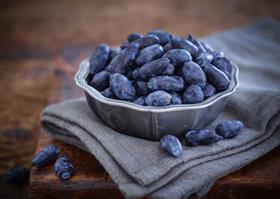
Since 2015, soft fruit specialist Soloberry has been heavily involved in bringing haskap berries (Lonicera caerulea L) to market in Europe.
The latest update in July this year, within the fresh produce industry, saw the announcement that due to changes in legislation, Soloberry could finally proceed with their notification to classify haskap berries as a traditional food under EU Regulation 2015/2283.
As of 13 December 2018, Soloberry has achieved the authorisation of “the placing on the market of berries of Lonicera caerulea L. as a traditional food from a third country under Regulation (EU) 2015/2283 of the European Parliament and of the Council and amending Commission Implementing Regulation (EU) 2017/2470”.
Soloberry has been successfully selling haskap outside of Europe and has had increasing interest from as far afield as Japan.
Demand has grown in Europe to both grow and buy haskap, particularly since its latest announcement on the progress of classification.
Soloberry can now sell haskap on the European market and has said it is excited to bring the berry into a market where it has built a considerable berry customer base over the past ten years.
'The team at Soloberry has invested great time and energy, with a professional approach, in its commitment to bring this product to market,' the group said in a statement. 'The successful submission of its dossier clearly showed Japanese Agriculture at Hokkaido Island has been proactively involved in managing the cooperative system of growers, logistics and sellers of haskap berry for over 25 years. This alongside evidence strongly suggesting that haskap berries have been found to be safe for consumption in Japan, helped to secure the change in status of haskap from novel to traditional food.'
The appeal of haskap as a new berry on the market stems from its 'superfood' credentials with higher levels of antioxidants than blueberries, and for growers it’s to their suitability for northern climates and low production costs.
Also known as Blue Honeysuckle or Honeyberry, haskap is shaped like a rectangular blueberry, and tastes like a cross between a blueberry, blackberry and raspberry.



